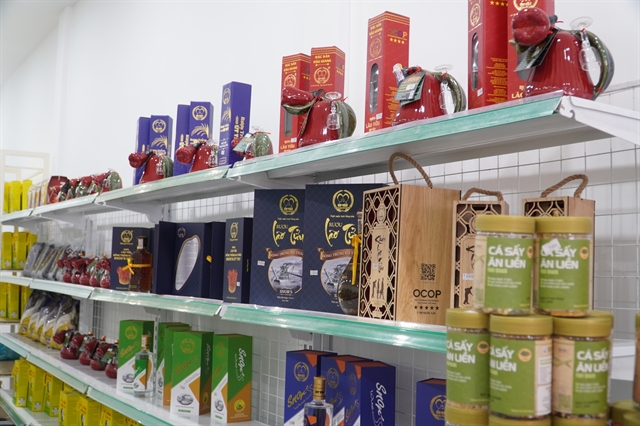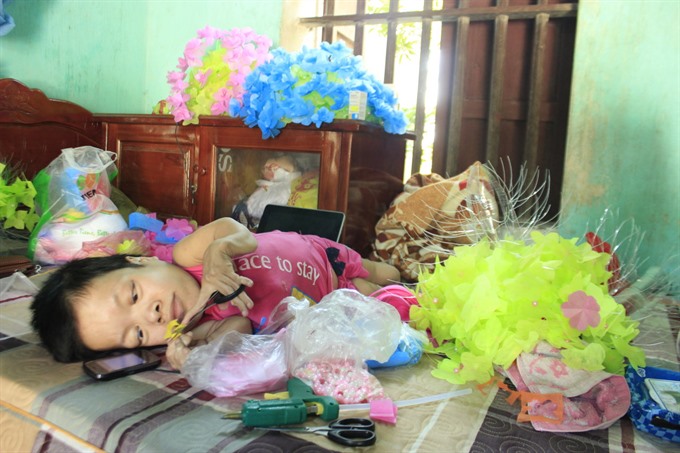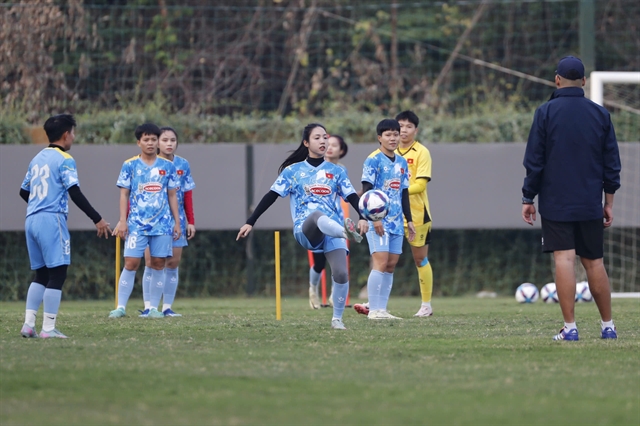 Society
Society

It took a lot of effort for Nguyễn Thị Hòa, a resident of the coastal city of Hải Phòng’s Tú Đôi Village, to learn how to use scissors.
 |
| Nguyễn Thị Hòa cuts paper flowers to make a bouquet. — Photo tuoitre.vn |
Nhã Nam
HẢI PHÒNG — It took a lot of efforts for Nguyễn Thị Hòa, a resident of the northern port city of Hải Phòng’s Tú Đôi Village, to learn how to use scissors.
Holding a piece of yellow paper in one hand and scissors in the other, the 37-year-old woman cut out identical five-petal flowers, then sewed them onto a plastic bottle and decorated it with colourful beads to make a bouquet.
She did it with ease, but that has not always been the case. At the age of three she succumbed to an illness that stopped her growth and left her virtually paralysed. Weighing only 10kg, Hoà’s life has been confined to a small bed.
Determined not to let life pass her by, Hòa learned to make crafts and developed a small brand of handmade crafts. Over the last three years, her craft products have become well known in her neighbourhood, reaching other localities and overseas Vietnamese.
She started the quest by chance.
“A friend brought some handmade flower baskets to me and asked me to sell them on social media,” Hòa told the Tuổi trẻ (Youth) newspaper. “I refused, because I didn’t want to use my disability as a tool to ask for sympathy.”
“There were people who told me I should go beg for money at festivals and celebrations, but I did not want to do that, either,” she said.
It took her a whole week just to learn to hold scissors. Sometimes she cut herself trying to cut perfectly-shaped paper flowers.
She can make two flower baskets a day if she really focuses. Once finished, she took photos of the products and introduced them on social media, where they drew appreciation from her friends.
“There are times when I can’t meet orders for customers from the central provinces of Hà Tĩnh and Ninh Thuận, from HCM City, from foreign countries, such as the US and France,” Hòa said.
Hòa’s immobility does not hinder her working process. She asks neighbours to help buy materials, such as papers, beads, glue guns and plastic bottles. Her sister-in-law helps her make the products, then packages and sends them to customers by post.
Wanting to share her achievement with other unfortunate people, Hòa along with her parents visits local people with disabilities and invites them to join her in making crafts.
“My idea is to found a group of craft-makers with disabilities to work together, generating income to support ourselves and lessening the burdens on our families,” she said.
“No one is calling me a ‘weirdo’ anymore,” she said. “My life has become more meaningful since I started creating things with my own hands.”
Statistics from the Ministry of Labour, Invalids and Social Affairs (MOLISA) in 2015 recorded 7.2 million people with disabilities in the country, accounting for some 9.2 per cent of the total population. Some 65-70 per cent of them were living off financial support from families, relatives, social assistance and charity.
Self-taught writer
Not able to go to school because of her disability, Hòa taught herself to read and write. When she is not making crafts, Hòa writes poems and short stories in the blank pages of her niece’s old notebooks.
“When I was little, one day a local veteran came to my house, gave me a notebook and told me that I had to find ways to ‘overcome ignorance’ by myself,” she recalled.
“I had to place my chin on a tissue box whenever I wanted to practice,” she said. “After several times clumsily scrawling the letters, I could finally write.”
“Hòa has an incredibly positive attitude towards life,” said Nguyễn Công Long, an economics student from the Việt Nam Maritime University. “Her craft products are beautifully made. I have helped her sell some of them.”
Inspired by Hòa’s strengths, a coffee shop owner in the city’s inner ward of Lạch Tray, some 20km away from Hòa’s village, invited her to share her story with a young audience.
Đặng Thị Tuyền, the coffee shop owner, is amazed with Hòa’s determination to move up in life.
“She said in front of the audience, loud and clear: ‘I am a very intelligent person,’ which is the most impressive thing I have ever heard from someone with disabilities,” Tuyền said.
“She talked about disabilities as if they were an experience, not a burden,” she added. “That is the strongest manifestation of the will to live.” — VNS




